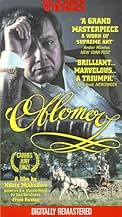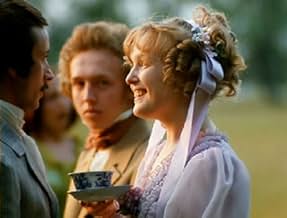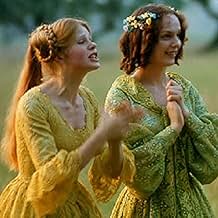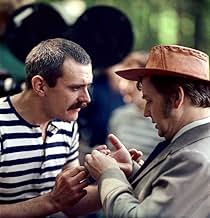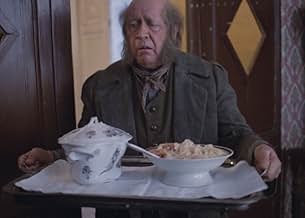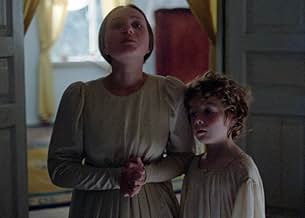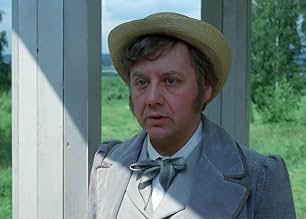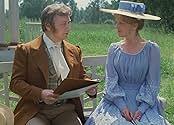Tage aus dem Leben Ilja Oblomows
Originaltitel: Neskolko dney iz zhizni I.I. Oblomova
IMDb-BEWERTUNG
7,6/10
2695
IHRE BEWERTUNG
Füge eine Handlung in deiner Sprache hinzuSt. Petersburg, mid 19th century: the indolent, middle-aged Oblomov. He sleeps much of the day. His boyhood companion, Stoltz, now an energetic and successful businessman, adds Oblomov to hi... Alles lesenSt. Petersburg, mid 19th century: the indolent, middle-aged Oblomov. He sleeps much of the day. His boyhood companion, Stoltz, now an energetic and successful businessman, adds Oblomov to his circle and introduces him to Olga.St. Petersburg, mid 19th century: the indolent, middle-aged Oblomov. He sleeps much of the day. His boyhood companion, Stoltz, now an energetic and successful businessman, adds Oblomov to his circle and introduces him to Olga.
- Regie
- Drehbuch
- Hauptbesetzung
- Auszeichnungen
- 2 Gewinne & 2 Nominierungen insgesamt
Yelena Kleshchevskaya
- Katya
- (as Ye. Kleshchevskaya)
Galina Shostko
- Olga's aunt
- (as G. Shostko)
Gleb Strizhenov
- The Baron
- (as G. Strizhenov)
Evgeniy Steblov
- Oblomov's father
- (as Ye. Steblov)
Evgeniya Glushenko
- Oblomov's mother
- (as Ye. Glushenko)
Nikolai Pastukhov
- Stoltz's father
- (as N. Pastukhov)
Empfohlene Bewertungen
I tried to read Goncharov's novel while in high school after having polished off books by Dostoyevsky, Tolstoy, and others, but Oblomov defeated me in the first few pages. It was just real tough to get into a story about a middle-aged, semi-retired government clerk who doesn't want to get out of bed all day. Now that I am middle-aged myself, I can relate to Oblomov's condition more. I still thought the first part of the movie (of which he actually does spend a good portion in bed) was slow, but after seeing the rest, I regretted never having finished the book. This is one of the greatest movies ever in any language describing what it is like to be depressed - afraid to make decisions and without energy to carry them out, and then what the consequences are of failing to act. With the help of his best friend, Stoltz, and his slogan "now or never" Oblomov manages to get out of his St. Petersburg apartment and begins to rebuild his life. Stoltz even introduces him to a young lady friend, Olga, and (while claiming she is "just a child") tells Oblomov that she and her aunt care take care of him (by keeping Oblomov from crawling back into bed) while he (Stoltz) is off to England. By Part II of the movie, Oblomov has shed 30 pounds and apparently 20 years, and has moved to the country, next door to Olga and her aunt. At this point the movie deals with romantic love from the point of view of a very shy, somewhat older man for a vibrant young woman, and it is this bitter-sweet part that is most moving and interesting. This is one of Nikita Mikhalkov's Soviet-period films, and while it is set is Czarist days and almost fondly lingers on the details of the opulent houses of the upper class, it also slips in several (mostly tongue-in-cheek) comments and observations about the inequality between classes and the uselessness of the aristocracy. For example, Oblomov, from his bed, chides his servant for doing nothing all day long. The cinematography is gorgeous. When Oblomov lazes in the grass among the birch trees, you can almost smell the countryside. This movie is slow to get started, but rewards the viewer's patience greatly by the end. Highly recommended!
10mbloxham
A definitively executed rendering of a work of romanticism; it's depth largely exceeding what can be attained from within a culture, such as the north american, that has either lost its history, or never had one; this to warn it is unlikely to be appreciated by one not already steeped in the film or theater of europe or the slavs. To someone who is, a sweet but not light experience: its lessons and philosophies cannot be contained, but envelope the reader, in his own life.
not a surprise. the novel by Goncharov is perfect choice for Mikhalkov style. Oleg Tabakov translate on screen the entire soft and fragile universe of his character. the atmosphere, the dialogs, the profound drama - pieces of a seductive film. and little more because, like in many same adaptations, the movie is a trip in the space between lines. Oblomov has new nuances. his struggle for happiness has new points who gives to the portrait from novel special significance. not a victim, not a symbol. but the good man who has a single challenge - himself. the portrait becomes seductive. and clear in new light. Tabakov explores the limits and the isles of illusion. and Mikhalkov has the courage and art and subtle science to transform the world of XIX century in shadow of a new Idiot. Oblomov becomes more realistic. and more easy to define it in a large measure. a film from a special art of seduction.
This story of a 19th-century Russian land owner (Oblomov) begins slowly, with scenes that puzzle and seem almost contradictory. The beginning denies you any emotional involvement, but as the film progresses you're dragged into Oblomov's psyche.
Early on there's a scene where two young boys are spinning themselves around in the seat of a swing to get dizzy. That's almost the sensation you get as you find yourself completely immersed in Oblomov's world. Not that you're reeling or disoriented, but that everything else becomes shut out.
The film moves along at a genteel pace, and, in that unique Russian way, when emotions burst through the societal veneer, you're completely clobbered. It's like someone sneaking up from behind and conking you on the head. The human condition being what it is, it's impossible not to identify with Oblomov. For anyone who has ever deliberated, doubted, or procrastinated--in other words, everyone--this film provides layers and layers of meaning, gently filtered through a portrait of Russian gentry.
To my surprise, I find myself wanting to call this a great film. It seems an improbable tag for such a slender story. But the crafting of the film is absolutely top tier: acting, cinematography, pacing--everything, really. Put that together with the haunting subtext, and you get a film well worth seeing.
Early on there's a scene where two young boys are spinning themselves around in the seat of a swing to get dizzy. That's almost the sensation you get as you find yourself completely immersed in Oblomov's world. Not that you're reeling or disoriented, but that everything else becomes shut out.
The film moves along at a genteel pace, and, in that unique Russian way, when emotions burst through the societal veneer, you're completely clobbered. It's like someone sneaking up from behind and conking you on the head. The human condition being what it is, it's impossible not to identify with Oblomov. For anyone who has ever deliberated, doubted, or procrastinated--in other words, everyone--this film provides layers and layers of meaning, gently filtered through a portrait of Russian gentry.
To my surprise, I find myself wanting to call this a great film. It seems an improbable tag for such a slender story. But the crafting of the film is absolutely top tier: acting, cinematography, pacing--everything, really. Put that together with the haunting subtext, and you get a film well worth seeing.
in many occasions, an adaptation is a war against novel. modifications, lost of book spirit, innovations or only errors. in this case, the masterpiece of Goncharov is key for open the Nikita Michalkov universe. recipes - respect for text, good cast, precise performance, Slav flavor. only is at right place. the drama of poor Oblomov is reconstructed, piece by piece, level by level, with grace, respect and love. more than a film, it may be a portrait or homage. and basic victory is science to transform the story in warm drawing of feelings and expectations, sins and fall. it is not a surprise. only new demonstration of Mikhalkow subtle art. and this is, for each of his films, the sign who makes difference, who gives a kind of aura to every movie and births air of refined melancholia.
Wusstest du schon
- PatzerWhen Oblomov is writing his farewell letter to Olga, the candles are nearly blown out by the wind, but the light shed remains the same.
- VerbindungenFeatured in Oleg Tabakov. Smotryu na mir vlyublyonnymi glazami (2015)
Top-Auswahl
Melde dich zum Bewerten an und greife auf die Watchlist für personalisierte Empfehlungen zu.
- How long is A Few Days from the Life of I.I. Oblomov?Powered by Alexa
Details
Zu dieser Seite beitragen
Bearbeitung vorschlagen oder fehlenden Inhalt hinzufügen

Oberste Lücke
By what name was Tage aus dem Leben Ilja Oblomows (1980) officially released in India in English?
Antwort
